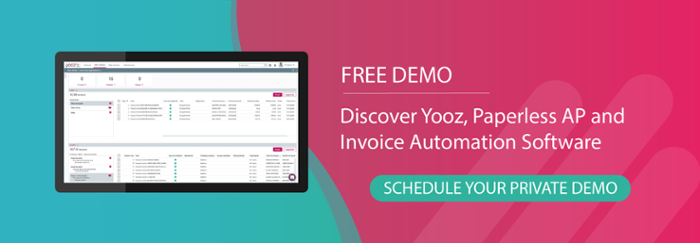Proper cash flow management plays a vital role in the success and growth of any organization regardless of the industry. It involves monitoring the movement of money, both incoming and outgoing, enabling organizations to determine their available funds at any given time. Indeed, cash flow is the lifeblood of any organization.
To ensure this success, it is crucial to implement effective strategies that improve Accounts Payable efficiency and strengthen financial stability. Unfortunately, many companies still face cash flow problems for many reasons, including inadequate financial forecasting and inaccurate data. However, by planning ahead and leveraging the right software solutions, business can prevent and overcome negative cash flow issues.
In the following sections we'll delve into the importance of proper cash flow management, explain why it matters, examine the repercussions of poor cash flow on organizations, and highlight how software automation can assist in achieving these objectives.

What is Cash Flow Management?
Cash flow management is a fundamental business process, critical to running any successful business. It involves the continuous monitoring and control of cash inflows to ensure the financial stability of an organization.
Effective cash flow management encompasses two key components: incoming cash and outgoing cash. Incoming cash involves monitoring and projecting the incoming cash from various sources such as sales revenue, investments, and loans. This allows business to have a clear idea of their expected income.
Outgoing cash involves tracking and managing all outgoing cash, including expenses such as supplier invoices, employee salaries, and any other operational costs. By closely monitoring expenditures, business can control their cash outflows and optimize their spending.
The ultimate goal of a company’s cash flow management is to achieve a positive cash flow. Positive cash flow indicates that a business is making more cash (Accounts Receivable) than it spends (Accounts Payable). This surplus can be used for various purposes: reinvesting in the company, expanding operations, or paying off debt. Positive cash flow is a key driver of profitability and business growth.
On the other side, negative cash flow management means that a business is spending more money than it makes. Often the result of poor cash flow management versus unforeseen circumstances, cash flow issues pose significant challenges since it restricts a company's ability to cover their operating expenses, limits growth opportunities, and can even cause businesses to go into debt.
How Proper Cash Flow Management Makes a Difference
Effective cash flow management is crucial for businesses of all sizes, whether you own a small firm or a sizable corporation. Here are several of the reasons why it is important and how it can be improved:
-
Gain financial insight
Cash flow management offers you greater insight into your finances. By understanding whether your business has a positive or negative cash flow, you can identify potential risks and make any necessary adjustments to decrease the possibility of cash flow issues.
-
Control expenses
Monitoring your cash flow allows you to evaluate how much revenue your business generates each month versus your total amount of monthly business expenses. Do you have enough money to pay the bills? If your business is spending more than it earns, you can proactively make any necessary changes to reduce costs and ensure that there is enough cash.
-
Anticipate future challenges
Managing your current cash flow enables you to forecast potential future cash flow issues in the near or distant future. Several factors can affect cash flow, and by staying on top of it you can ensure that your business has sufficient funds set aside to successfully navigate any unexpected periods.
-
Streamline Accounts Payable
Maintaining a close watch on cash flow can improve Accounts Payable efficiency by ensuring timely payment of supplier invoices. Businesses with a positive cash flow can utilize Accounts Payable software to automatically settle invoices, fostering strong relationships with both suppliers and vendors.
-
Increase positive cash flow
Regularly monitoring cash flow empowers businesses to identify and make any necessary adjustments to improve their cash situation. By proactively managing the cash flow, you can increase the likelihood of maintaining the positive cash flow crucial for growth.
-
Enhance business survival
Organizations with a positive cash flow are much more likely to succeed, while those with poor cash flow management face a higher risk of failure (especially within the first few years of operation).
-
Create accurate projections
Cash flow management enables organizations to make accurate cash flow projections based on current financial data. By tracking revenue and expenditures over a set period (e.g., 6 or 12 months), businesses can make informed decisions regarding hiring, supplier relationships, expansion, and other financial commitments.
-
Prepare for external factors
By analyzing cash flow projections based on real-time information, businesses can assess whether they have sufficient resources to navigate any unexpected external factors, such as rising supplier costs or inflation. If projections indicate potential cash flow issues, proactive measure can be taken in advance to minimize the risk of any cash flow issues.
In short, effective cash flow management offers valuable insights into your business finances, helps to control expenses, allows for proactive planning, improves relationships with suppliers, increases the likelihood of positive cash flow, enhances business survival, enables accurate projections, and prepares for any possible external factors.
By prioritizing proper cash flow management, businesses can achieve financial stability and position themselves for long-term success.

What Impact Does Negative Cash Flow Have?
Negative cash flow has significant implications for businesses, particularly for small businesses, and can lead to various problems and potential risks. In fact, research by a US bank indicated that poor cash flow has been cited as the reason that more than 80% of businesses fail.
Let's examine some of the critical issues that arrive from poor cash flow management strategies:
1. Restricts profitability
When a business has a negative cash flow, it means that they have less money coming in then they do going out. As a result, little to no profit is being made. Without sufficient profits, businesses will struggle to grow or expand, which can eventually force them to close. By improving cash flow, businesses can generate profits and invest in their growth and development.
2. Supplier payment issues
Negative cash flow affects the ability to settle supplier or vendor invoices on time. This delay in payments not only strains the relationship with suppliers but also increases the likelihood of accumulating debt and risk liquidation. By maintaining a healthy cash flow, businesses can meet their financial obligations and maintain positive relationships with suppliers.
3. Employee wage delays
A negative cash flow doesn't just affect supplier payments; it also has consequences on being able to pay employee wages accurately and on time. Failing to meet payroll obligations can severely damage employee morale, lead to legal issues, and eventually create a negative workplace for current and any potential employees. By ensuring a positive cash flow, businesses can meet their payroll obligations, retain talent, and foster a positive, productive work environment.
4. Limited investment opportunties
Having an insufficient cash flow restricts companies from being able to invest in new opportunities, including research and development, marketing campaigns, or expanding into new markets. Without having the necessary funds, businesses risk missing out on growth prospects and lose their competitive edge. Having a positive cash flow enables businesses to seize strategic opportunities and drive innovation.
5. Increased reliance on borrowing:
Having a negative cash flow often forces businesses to rely on loans and credit lines to cover daily expenses and financial obligations. This reliance on borrowing can lead to mounting debt, high interest payments, and ultimately financial instability. By managing cash flow effectively, businesses can reduce their dependence on external financing and improve their financial health.

How Software Automation Helps Manage Cash Flow
Software automation offers numerous benefits for managing cash flows, helping organizations to overcome the limitations of manual business processes. Human error can significantly affect accuracy and therefore, projections.
By leveraging technological advancements such as Accounts Payable automation, automated invoice processing, and e-invoicing, businesses can significantly improve their cash flow projections. Here are some of the ways that software automation cna make a difference:
1. Eliminate manual errors:
Manual data entry is prone to error, even when those responsible for managing and overseeing an organization's finances pay meticulous attention to detail. These errors can have a substantial impact on cash flow projections. However, with software automation, all data is electronically input via scanning or uploading invoices, effectively eliminating the risk of manual error.
2. Real-time and accurate insights:
With real-time data available at the touch of a button, software solutions provide organizations with real-time and accurate information about their cash flow management and view their cash flow and projections with ease.
3. Reduction in manual labor:
Although manual labor cannot be entirely replaced by software automation, implementing software automation solutions can significantly reduce the reliance on manual processes for tracking and managing cash flow. This reduction translates to lower salary expenses (expenditures or outflow of cash), contributing to a positive cash flow. In addition, employees are freed up to fulfill duties in other business divisions, such as marketing and sales, ultimately enhancing overall cash flow.
By embracing software automation, businesses can optimize their cash flow management, mitigate errors, gain real-time insights, and reduce manual labor. This all leads to an improved financial performance.
Discover How Software Automation Can Boost a Positive Cash Flow
If your organization is struggling with cash flow management or looking to improve efficiency, incorporating software automation into your business practices can be of great benefit.
At Yooz, we’ve designed user-friendly software automation solutions that are specifically designed to streamline your accounting and cash flow management processes. With just a click of a button, our software is easily accessible and can provide the support that you need to achieve your goals.
To learn more about our software solution, reach out today to schedule a free private demonstration.









